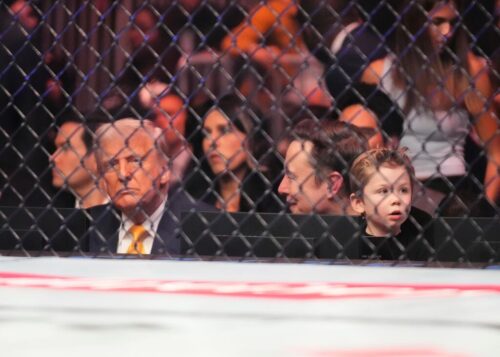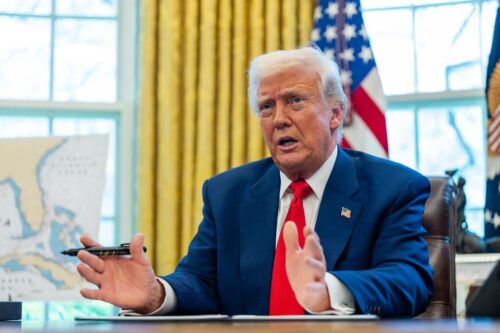As President Trump’s trade policy has started to take shape, officials at the Federal Reserve have been more vocal about how such sweeping tariffs will affect the economy.
Jerome Powell, the chair of the central bank, warned that levies of the scope and scale Trump is pursuing would most likely lead to even higher inflation and slower growth than initially expected — the makings of what’s known as a stagflationary shock.
Powell expanded on those remarks Wednesday, stressing that the tariffs announced so far go well beyond what the Fed had expected even in its worst-case scenario. In a speech at the Economic Club of Chicago, he laid out in greater detail how the Fed would deal with a situation in which its goals for a healthy labor market as well as low and stable inflation clashed with one another.
“We may find ourselves in the challenging scenario in which our dual-mandate goals are in tension,” Powell said. “If that were to occur, we would consider how far the economy is from each goal and the potentially different time horizons over which those respective gaps would be anticipated to close.”
In a moderated discussion after his speech, Powell said the Fed would have to make “what will no doubt be a very difficult judgment” about which of its goals to prioritize.
Powell’s comment accelerated a sell-off in stocks, with the S&P 500 down around 2.5 percent in afternoon trading. US government bonds rallied, while the dollar continued to weaken against a basket of major currencies.
The recent whiplash over which products are subject to tariffs, by how much, and for how long, has stoked extreme uncertainty about the economic outlook, leading to diverging views about when the central bank may be able to cut interest rates again.
So far, most officials have taken the view that the inflationary impact from tariffs should not be underestimated, especially in light of certain measures of inflation expectations that show consumers starting to anticipate higher prices. Powell on Wednesday again warned that Trump’s policies could breed persistently higher inflation and reiterated that it was the Fed’s “obligation” to ensure that “a one-time increase in the price level does not become an ongoing inflation problem.”
He also said he would be closely monitoring how long it takes for the inflationary impact to flow through the economy. In some sectors, such as the automobile industry, he warned that supply chains could be “disrupted significantly.”
“You would worry that that process will take some years and that the inflationary process might be extended,” he said.
Powell made clear that keeping expectations about future inflation in check was the Fed’s top priority.
“Without price stability, we cannot achieve the long periods of strong labor market conditions that benefit all Americans,” Powell added. He stressed that the Fed could afford to be patient on taking further action on interest rates until it had more clarity about the economic outlook.
Overall, Powell’s remarks suggest that the bar for interest rate cuts is high, meaning that the central bank is likely to need tangible evidence that the labor market is cracking before it takes action. Economists in this camp see the Fed keeping interest rates at their current range of 4.25 percent to 4.5 percent for the remainder of the year before lowering them in 2026.
But other perspectives have started to emerge at the Fed as well, underscoring the vast uncertainty that Trump’s policies have stoked.
One outlier is Christopher Waller, a Fed governor. He laid out an argument Monday for why surging inflation from Trump’s tariffs could be temporary, reviving a view that came to haunt the central bank after the supply chain shock that followed the COVID-19 pandemic. Officials had initially billed the price pressures as “transitory,” resulting in the Fed keeping interest rates too low for too long and worsening the extent of the inflation problem, which they have yet to fully overcome.
The crux of Waller’s argument is that tariffs of the magnitude that the president has put in place, if sustained, will be so damaging to economic growth and the labor market that they will weigh on inflation over time.
Using a scenario in which the average tariff imposed on US imports remains around its current level of 25 percent for an extended period, Waller forecast consumer price growth to spike to around 4 percent this year before fading as the economy slowed “to a crawl” and the unemployment rate jumped to 5 percent. The unemployment rate currently stands at 4.2 percent.
“I expect the risk of recession would outweigh the risk of escalating inflation, especially if the effects of tariffs in raising inflation are expected to be short-lived,” said Waller, who was appointed to the central bank by Trump in his first term. That would support interest rate cuts “sooner and to a greater extent” than initially expected, he added.
In the event that Trump keeps in place a more modest 10 percent universal tariff and removes other levies, Waller said the Fed could afford to be more patient about cuts as the likely inflation bump and growth slowdown would be more muted.
On Wednesday, Powell was also asked about the recent turbulence in US financial markets. Stocks have finally steadied after a week of heavy losses that were accompanied by a sharp sell-off in US government bonds and the dollar. Typically investors flock to those assets during times of stress, so the unusual trifecta of selling fanned fears that the country’s safe haven status was under threat.
Powell said financial markets were “orderly and functioning as you would expect them to in this time of high uncertainty,” even as he warned of the possibility of “continued volatility.” He added that the central bank stood ready to provide dollar funding as needed.
“We want to make sure that dollars are available,” he said.
Asked about the Fed’s ability to set interest rates free from political interference, Powell said the central bank’s independence was a “matter of law” and something that had bipartisan support. He mentioned an ongoing legal challenge that is set to be heard by the Supreme Court involving Trump’s ability to fire officials at independent agencies but said he does not expect that decision to apply to the Fed.
“It’s a situation we are monitoring carefully,” he said.
This article originally appeared in The New York Times.
Where things stand for Trump in global tariff battleThe art of the walk back: Trump’s tariff tactics are all noise, no strategyTrump’s tariffs have launched global trade wars. Here’s a timeline of how we got here.




Comment count: